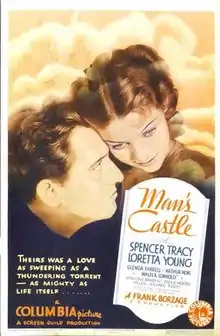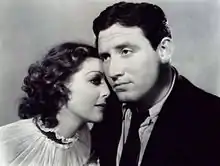Man's Castle
Man's Castle is a 1933 pre-Code American film directed by Frank Borzage and starring Spencer Tracy and Loretta Young.
| Man's Castle | |
|---|---|
 Movie poster | |
| Directed by | Frank Borzage |
| Screenplay by | Jo Swerling |
| Based on | Man's Castle play by Lawrence Hazard |
| Starring | Spencer Tracy Loretta Young |
| Music by | W. Franke Harling |
| Cinematography | Joseph H. August |
| Edited by | Viola Lawrence |
| Distributed by | Columbia Pictures |
Release date | October 27, 1933 |
Running time | 75 minutes/66 minutes |
| Country | United States |
| Language | English |
Plot
Well-dressed Bill (Spencer Tracy) takes pity on Trina (Loretta Young), a hungry young woman he meets in a city park and treats her to a dinner in a fancy restaurant. After she is finished, he informs the manager he has no money. He then raises such a ruckus that the manager is all too willing to let them go. When Bill learns that Trina is also homeless, he lets her stay at his ramshackle home in a shanty town. Among their neighbors and friends are widowed former preacher Ira (Walter Connolly) and Flossie (Marjorie Rambeau), an alcoholic older woman Ira is trying to reform.
Bill is a wandering sort, unwilling to live in the same place too long. Trina falls in love with him, but wisely makes no demands that will make him feel trapped in their developing relationship. When she longs for a new stove, he raises the down payment by serving a summons on Fay La Rue (Glenda Farrell), the star of a show. Far from resenting it, Fay wants him for a playmate. He is tempted, but turns her down. Just as Bill's restless nature starts becoming too much for him, Trina tells him she is pregnant. Ira presides at Bill and Trina's wedding.
Before hitting the road by himself, Bill decides to get enough money to support his wife and future child. He agrees to help slimy neighbor Bragg (Arthur Hohl) rob the payroll from a toy factory where Bragg used to work. Ira, the night watchman, shoots Bill before recognizing him, but it is only a flesh wound. Wanting Trina for himself, Bragg turns on the burglar alarm, but Bill gets away with Ira's help. Back home, Trina dresses the wound. Flossie suggests that Bill take Trina away with him, solving Bill's dilemma. After they leave, Bragg threatens to set the police on their track, but Flossie silences him with Ira's gun.
Cast

- Spencer Tracy as Bill
- Loretta Young as Trina
- Marjorie Rambeau as Flossie
- Glenda Farrell as Fay La Rue
- Walter Connolly as Ira
- Arthur Hohl as Bragg
- Dickie Moore as Joie
Production
1938 reissue
Columbia re-released the film in 1938, to take advantage of Tracy's much greater popularity. However, with the Production Code in full force, the Hays Office mandated nine minutes of cuts to win a seal of approval. This resulted in a number of blatantly obvious jump cuts where racy dialogue has been removed, as well as the deletion of a shot of a nude Young (or more likely a stunt double) diving into the river. This 66-minute version is all that currently survives, although Sony Pictures (the parent company of Columbia) continues to search for the deleted trims.
Columbia's movie channel showed Man's Castle in April 2016. The stated running time is 78 minutes. There are no obvious jump cuts or any apparent attempt to gloss over Trina's pregnancy.
Reception
Critical reception
Mordaunt Hall in The New York Times remarked, "Even though Frank Borzage in his direction of Man's Castle, ... gives an occasional fleeting reminder of his successful silent film, Seventh Heaven the story is by no means as plausible or as poetic as that memorable old work. ... Man's Castle can, however, boast of the thoroughly efficient portrayals of Spencer Tracy and Loretta Young, particularly Mr. Tracy's. Their work results in much of the narrative being quite interesting and several of the scenes are blessed with touches of originality." The film's box office performance was described as "dismal".[1]
The film was a box office disappointment.[2]
In 1998, Jonathan Rosenbaum of the Chicago Reader included the film in his unranked list of the best American films not included on the AFI Top 100.[3]
Recognition
The film is recognized by American Film Institute in these lists:
- 2002: AFI's 100 Years...100 Passions – Nominated[4]
References
- Douglas W. Churchill (December 30, 1934). "The Year in Hollywood: 1984 May Be Remembered as the Beginning of the Sweetness-and-Light Era". New York Times. p. X5.
- D. W. (November 25, 1934). "Taking a Look at the Record". New York Times. ProQuest 101193306.
- Rosenbaum, Jonathan (June 25, 1998). "List-o-Mania: Or, How I Stopped Worrying and Learned to Love American Movies". Chicago Reader. Archived from the original on April 13, 2020.
- "AFI's 100 Years...100 Passions Nominees" (PDF). Retrieved August 19, 2016.
External links
| Wikimedia Commons has media related to Man's Castle. |
